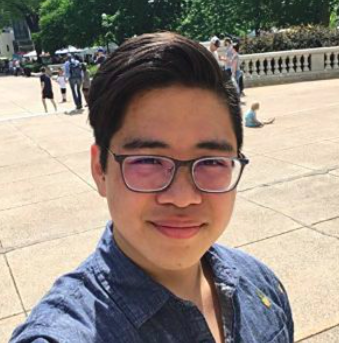 Matthias Chan wrote a blog, narrating his journey to agnostic atheism, after doing classwork at the Center for Religion and Global Citizenry at the University of Wisconsin-Madison. It is also posted at the center’s website.
Matthias Chan wrote a blog, narrating his journey to agnostic atheism, after doing classwork at the Center for Religion and Global Citizenry at the University of Wisconsin-Madison. It is also posted at the center’s website.
“I really liked Matthias’ essay: His thoughtfulness, respect for the differing beliefs of others, and his eloquence of writing,” said scholarship benefactor Thomas W. Jendrock, who has been contributing scholarship funds since 2013, for “a student who exhibits an atheist perspective which is positive, confident, introspective, constructive, optimistic and caring — and considerate and respectful toward individuals who do not share our beliefs.” Matthias received a $1,000 scholarship.
By Matthias Chan
Thomas W. Jendrock Student Activist Award: Wisconsin student ‘empowered by atheism
Be the God you want to see in the world.
Now that I’ve gotten your attention, let me explain.
In my spiritual journey throughout the school year, after exploring many faiths and religions through the Center for Religion and Global Citizenry and discussions with other interfaith fellows, I’ve finally ended up at agnostic atheism. Believing that there is no God, however, wasn’t as liberating as one may think. Instead, it put a huge burden on me. Because God wasn’t telling me what was right and wrong, and there wasn’t some divine plan that worked for the good of everyone, it placed the burden on me to fill in those gaps.
For atheists and agnostics, for whom a divine judge is absent, humanity has become the sole arbiter of right and wrong. We’re not just the judge, but we are the jury and executioner, as well. To borrow some terminology from Nietzsche, God is dead and we have replaced him. Because God is no longer sitting on his throne in heaven, there’s nobody looking out for us up there and making sure that everything is going to be all right. That is now our responsibility.
Theologians like Irenaeus, Augustine, Al-Ghazali and Ibn Sina have struggled with the question of how suffering exists under the rule of an all-powerful God. But now, in the void vacated by the Almighty, it’s our job to alleviate the wounds of humanity.
This task isn’t just for those who doubt the supernatural. Embodying the compassion our world needs is a fundamental tenet of all the world’s religions. Abraham shows kindness and hospitality to complete strangers and guests. St. Paul urges Christians in Ephesus to embody Jesus’s self-sacrifice. Krishna teaches Arjuna to treat all beings with kindness and compassion, and Buddha commanded his followers to show compassion to all beings. Guru Nanak told early Sikhs that they must show kindness to all. Zoroaster said, “Doing good to others is not a duty. It is a joy, for it increases your own health and happiness.” All of these holy figures knew the importance of kindness and compassion, and they all practiced it in their daily lives.
I dream of a future where atheists, theists and everyone in between unite to create a better world, because it’s time for us to take up our role and be what we want and need God to be in a world filled with pain and suffering. It’s time for us to become the God we want to see in this world. It’s our duty to become selfless, protective, generous, loving and everything else that we know humanity desperately needs in order to repair the world and work toward the greater good for all. In the words of Jim Greenbaum, founder of the Greenbaum Foundation, “Being a bystander to suffering is not an option.”
Be the God you want to see in the world.
Matthias writes: “I’m studying computer science and religious studies at UW-Madison. I was raised in a nondenominational Christian home in Wisconsin, and although I no longer identify with any organized religion, I have a passion for studying world religions, their history, and their philosophical and theological thought.”

